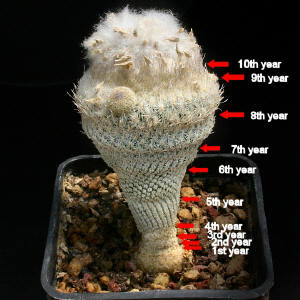|
|
| |
|
|
| |
The length of an organism
existence extending from the beginning or birth to any given time.
<a plant 10 years of age> |
|
| |
|
|
Age of plants: Plants too
are mortal creatures and have finished life duration, but it is
usually difficult to tell the age of a plant whit precision as
it depends on complex genetics and environmental factors. These
conditions can often be altered so that the plant can be induced
to undergo an early (or tardy) development. For example e plant
can reach a life stage only when genetic factors ( including
photoperiod ) and environmental conditions (water availability,
etc..) are congenial. Plants grown under more or less favourable
condition can attain a given life stage or size in a variable
time.
Only the age of some plants can be visualized as a clock that
measures the "age" by counting the number of some specific
characteristic, for examples in a tree it is possible to count
the annul ring in a trunk section, in some succulent it is
possible to count the annual narrowing formed in the stem. |
 |
|
| |
|
|
|
(2) Age
[
Biology ]
Synonym: Stage of
life. |
|
| |
|
|
| |
A life stage (usually
defined in years) at which some particular quality or feature
develops < The age of maturity, the
fruiting age, etc. > |
|
| |
|
|
| Usually the
development of an individual's to a given stage is measured in
terms of the years requisite for like development of an average
individual an individual's development measured in terms of the
years requisite for like development of an average individual |
|
| |
|
|
|
|
|
| |
|
|
| |
A unit of geological and biological
time which is distinguished by some feature. |
|
| |
|
|
An age is shorter than epoch, usually
lasting from a few millions of years to about a hundred million
years. (also Era, epoch, period, time)
-
In geology an age is the formal unit of lowest rank, below
epoch, during which the rocks of the corresponding stage were formed
or during which a particular geologic event or series of events
occurred or was marked by special physical conditions; e.g. the "Ice
Age."
-
In biology an age is a division of time of
unspecified duration in the history of the Earth, characterized by a
dominant or important type of life form. For example the
"age of mammals", “age of reptiles” It is often expressed in years
before present.
|
|
(4) To age
[ Transitive and Intransitive verb]
(aged - aging or ageing) |
|
| |
|
|
|
Intransitive verb |
|
| |
-
a : To become old : begin to seem older, show the effects or
the characteristics of increasing age
-
b:To acquire a desirable quality (as ripeness) by standing
undisturbed for some time <letting fruit age>
|
|
Transitive verb |
| |
|
|
|